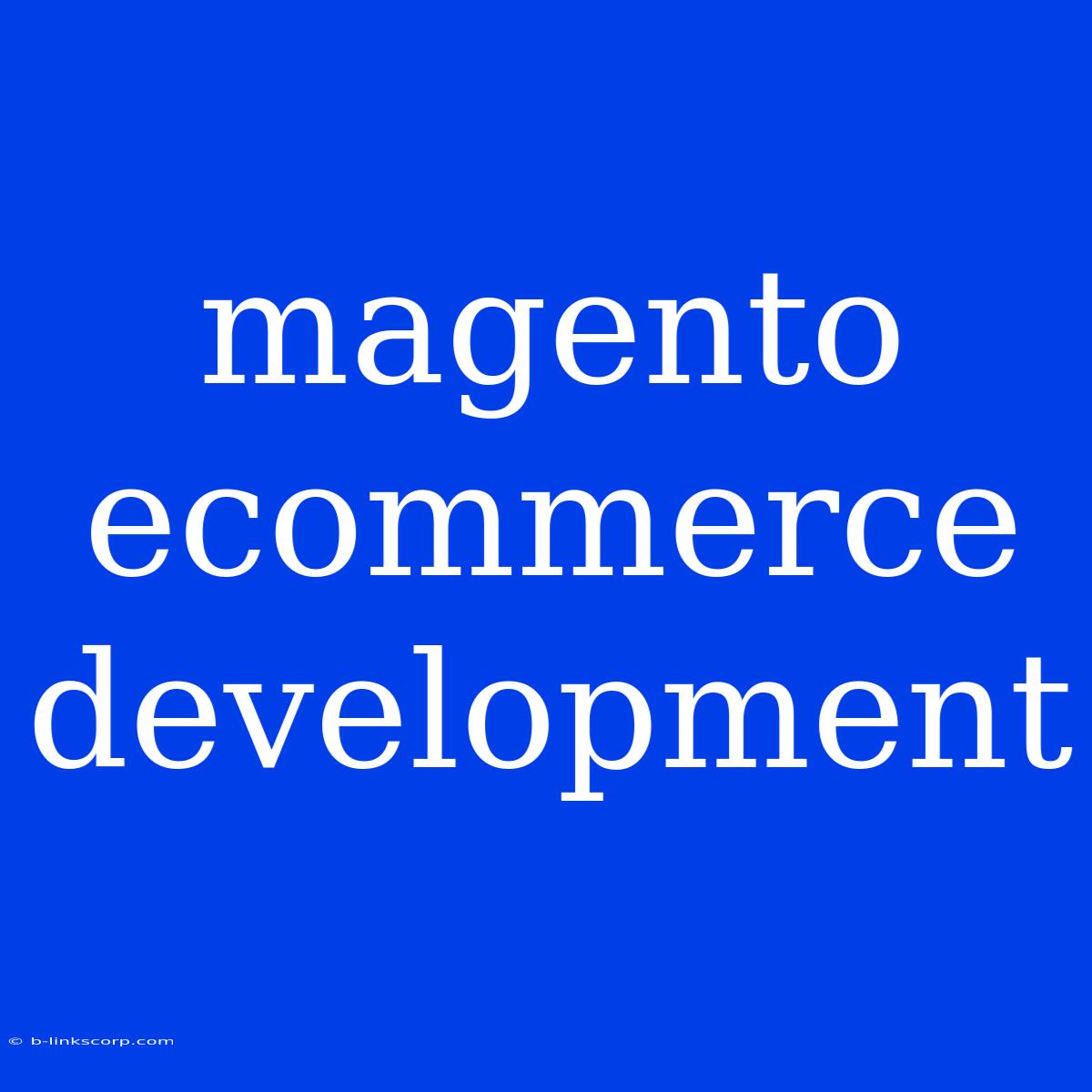Magento Ecommerce Development: The Ultimate Guide to Building Your Online Empire
Magento is a powerful open-source eCommerce platform that empowers businesses of all sizes to build robust and scalable online stores. Its flexibility and extensive feature set make it a popular choice for businesses looking to create a customized, feature-rich, and high-performing online shopping experience. This article will delve into the world of Magento eCommerce development, providing a comprehensive guide to understanding its key features, benefits, and how to get started.
Why Choose Magento for Your Ecommerce Platform?
Magento offers a wealth of advantages that make it a compelling choice for businesses looking to establish or enhance their online presence:
1. Comprehensive Functionality: Magento boasts a wide range of built-in features, including product catalog management, order processing, payment gateways integration, marketing tools, and reporting. This eliminates the need for third-party integrations for many core functionalities.
2. Customization and Flexibility: Magento's open-source nature allows for extensive customization and flexibility. Developers can modify core functionalities, add new features, and integrate with third-party applications to create a truly unique online store tailored to specific business needs.
3. Scalability: Magento is designed to handle large volumes of traffic and product catalogs, making it suitable for businesses of all sizes. Its scalability ensures smooth operation as your business grows, allowing you to expand your product offerings and customer base without performance issues.
4. SEO Optimization: Magento is built with SEO in mind, featuring built-in features like URL rewriting, sitemaps, and meta tag management. This helps improve your online store's visibility in search engine results, driving more organic traffic to your website.
5. Strong Community Support: Magento benefits from a large and active community of developers, merchants, and experts. This provides access to a wealth of resources, including documentation, tutorials, and support forums, making it easier to learn and troubleshoot issues.
Essential Components of Magento Ecommerce Development
Magento eCommerce development involves several key components, each playing a crucial role in creating a successful online store:
1. Theme Selection: Choosing the right theme is essential for establishing your online store's visual identity. Magento offers a variety of themes, both free and paid, providing options to suit different brand aesthetics and industry niches.
2. Extension Integration: Magento's extensive marketplace offers a vast collection of extensions, which are specialized modules that enhance existing functionality or add new features. Extensions can be used to integrate with payment gateways, shipping carriers, social media platforms, and other third-party services.
3. Custom Development: For truly unique functionalities or specific business needs, custom development is often required. This involves building custom modules, modifying existing code, or integrating with external systems to create a tailored online store experience.
4. Security and Maintenance: Maintaining a secure and well-maintained Magento store is crucial for protecting customer data and ensuring smooth operation. Regular updates, security patches, and performance optimization are essential.
Getting Started with Magento Ecommerce Development
Starting your Magento eCommerce journey involves these key steps:
1. Choose Your Magento Edition: Magento offers two editions: Open Source (free) and Commerce (paid). The Open Source edition is suitable for smaller businesses, while the Commerce edition provides advanced features and support for larger enterprises.
2. Select a Hosting Provider: Choosing the right hosting provider is essential for ensuring your online store's performance and security. Look for hosting providers specifically designed for Magento and offer features like server-side caching, load balancing, and security measures.
3. Install Magento: Once you have selected a hosting provider, follow the installation instructions provided by Magento. The installation process typically involves downloading the software, uploading it to your server, and configuring the database and other settings.
4. Configure Your Store: After installation, configure your store settings, including product catalog, payment gateways, shipping methods, and tax settings.
5. Start Building Your Store: Once your store is configured, begin creating product pages, adding content, and customizing your theme to create a unique shopping experience for your customers.
Conclusion
Magento eCommerce development offers a powerful and flexible platform for businesses to create successful online stores. Its comprehensive features, customization options, scalability, and strong community support make it a compelling choice for businesses seeking to establish a robust and engaging online presence. By leveraging the expertise of experienced Magento developers and adhering to best practices, businesses can leverage Magento's potential to create thriving online empires.

